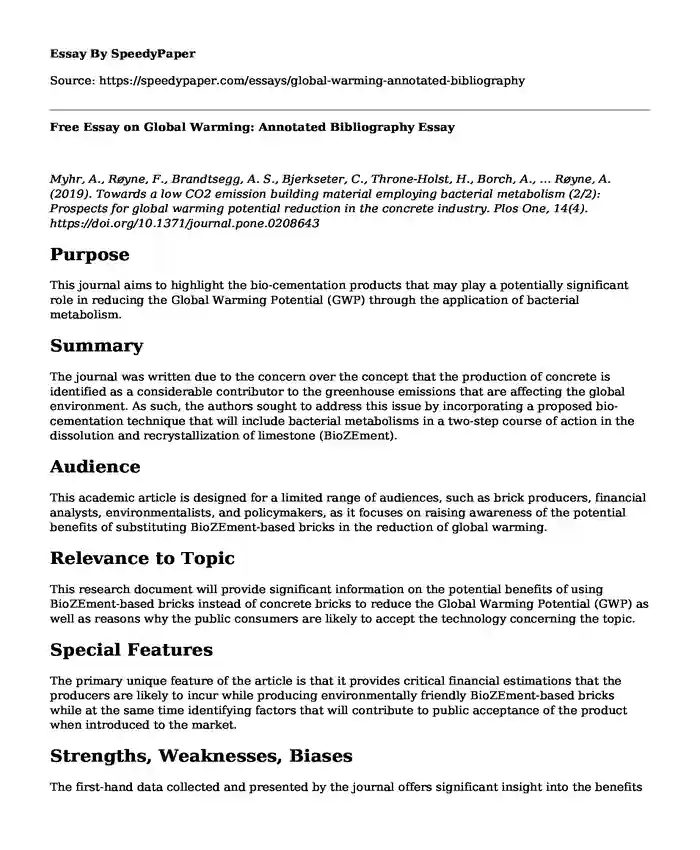
| Essay type: | Problem solution essays |
| Categories: | Ecology Global warming Literature review Climate change |
| Pages: | 4 |
| Wordcount: | 827 words |
Myhr, A., Røyne, F., Brandtsegg, A. S., Bjerkseter, C., Throne-Holst, H., Borch, A., … Røyne, A. (2019). Towards a low CO2 emission building material employing bacterial metabolism (2/2): Prospects for global warming potential reduction in the concrete industry. Plos One, 14(4). https://doi.org/10.1371/journal.pone.0208643
Purpose
This journal aims to highlight the bio-cementation products that may play a potentially significant role in reducing the Global Warming Potential (GWP) through the application of bacterial metabolism.
Summary
The journal was written due to the concern over the concept that the production of concrete is identified as a considerable contributor to the greenhouse emissions that are affecting the global environment. As such, the authors sought to address this issue by incorporating a proposed bio-cementation technique that will include bacterial metabolisms in a two-step course of action in the dissolution and recrystallization of limestone (BioZEment).
Audience
This academic article is designed for a limited range of audiences, such as brick producers, financial analysts, environmentalists, and policymakers, as it focuses on raising awareness of the potential benefits of substituting BioZEment-based bricks in the reduction of global warming.
Relevance to Topic
This research document will provide significant information on the potential benefits of using BioZEment-based bricks instead of concrete bricks to reduce the Global Warming Potential (GWP) as well as reasons why the public consumers are likely to accept the technology concerning the topic.
Special Features
The primary unique feature of the article is that it provides critical financial estimations that the producers are likely to incur while producing environmentally friendly BioZEment-based bricks while at the same time identifying factors that will contribute to public acceptance of the product when introduced to the market.
Strengths, Weaknesses, Biases
The first-hand data collected and presented by the journal offers significant insight into the benefits of producing BioZEment-based bricks to reduce the potential of global warming. Nevertheless, the article is only understandable to a limited audience, which limits its ability to create awareness on the consequence of producing concrete on global warming.
Quotes
“The use of biotechnology in the manufacture of construction materials is regarded as a promising method for reducing the environmental impacts of the construction industry because these materials can be made with renewable energy sources and low-temperature requirements.” (Myhr et al., 2019, p. 26).
“A product with low emissions is likely to have an impact on global emissions if it is significantly cheaper and equal to or more practical than the alternatives, thus enabling large-scale application” (Myhr et al., 2019, p. 26).
“…Because of the high uncertainty of water demand at this stage of the BioZEment development, both the GWP of water processing and wastewater treatment are omitted” (Myhr et al., 2019, p. 26).
Whitehorn, J., & Yacoub, S. (2019). Global warming and arboviral infections. Clinical Medicine, 19(2), 149–152. https://doi.org/10.7861/clinmedicine.19-2-149
Purpose
This document considers the effects of climate change on three specific arboviruses with specific regards to their effect on Europe.
Summary
The article was written to assess the extent to which adjustments in climate have resulted in the expansion of the geographic footprint of arboviral infections. Furthermore, the article raises concerns on the nonlinear connection between climate change and the expansion of arboviral infection.
Audience
This scholarly journal is designed for an unlimited range of audiences, such as scientists, microbiologists, students as well as the public as it highlights how climate change has resulted in arboviral expansion.
Relevance to Topic
This study will provide noteworthy information on how the concept of climate change will affect the movement of both people and animals due to the increased complexity of the emergence of arboviral infections
Special Features
The primary unique feature of the article is that it provides critical information relating to the notion of combating the health risks that are associated with the emergence of arboviruses.
Strengths, Weaknesses, Biases
The first-hand information that the document presents offers the readers with an insight into the health effects of climate change on both human beings and animals. Nonetheless, the article provides insufficient information regarding the risk factors that promote faster spread of the arboviruses.
Quotes
“The earth is warming and there is almost universal consensus that human activities are contributing to this in an unprecedented way.” (Whitehorn & Yacoub, 2019, p. 149).
“Climate change is likely to contribute to the expansion of the outer limits of arboviral transmission.” (Whitehorn & Yacoub, 2019, p. 151).
“While climate change is certainly a factor in the increased rates of arboviral transmission it should not be viewed in isolation –” (Whitehorn & Yacoub, 2019, p. 151).
References
Myhr, A., Røyne, F., Brandtsegg, A. S., Bjerkseter, C., Throne-Holst, H., Borch, A., … Røyne, A. (2019). Towards a low CO2 emission building material employing bacterial metabolism (2/2): Prospects for global warming potential reduction in the concrete industry. Plos One, 14(4). https://doi.org/10.1371/journal.pone.0208643
Whitehorn, J., & Yacoub, S. (2019). Global warming and arboviral infections. Clinical Medicine, 19(2), 149–152. https://doi.org/10.7861/clinmedicine.19-2-149
Cite this page
Free Essay on Global Warming: Annotated Bibliography. (2023, Nov 03). Retrieved from https://speedypaper.net/essays/global-warming-annotated-bibliography
Request Removal
If you are the original author of this essay and no longer wish to have it published on the SpeedyPaper website, please click below to request its removal:
- Free Essay on Francis Bacon's Novum Organum
- Political Science Essay Example: Bernie for Bernard Sanders
- Essay Sample on I Heard A Fly Buzz by Emily Dickinson
- Free Essay Sample on Environmental Campaign
- Causes of Prison Gang Essay Sample
- Free Essay Summary of the Book The Prince
- Free Essay Example - Greek Friendship
Popular categories




